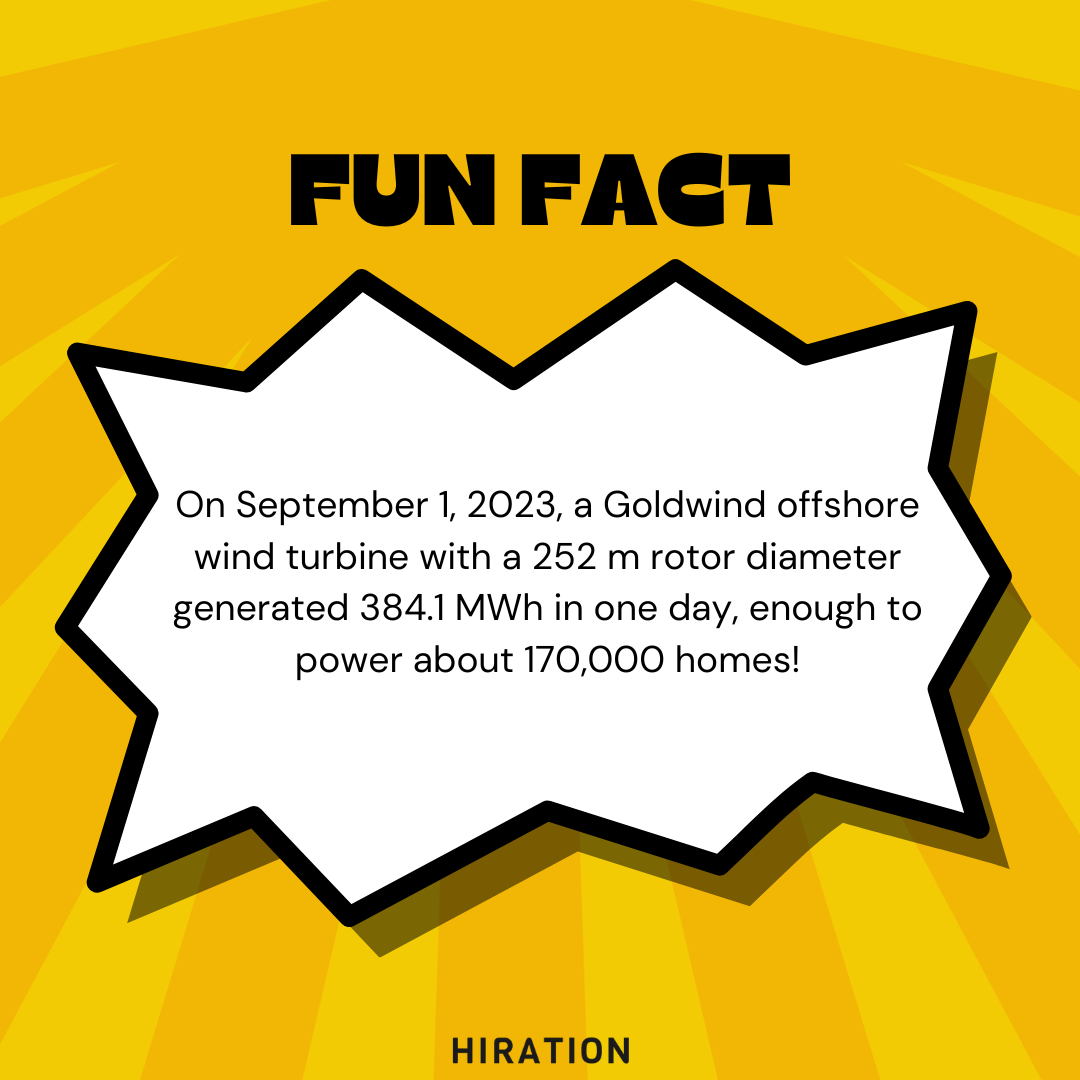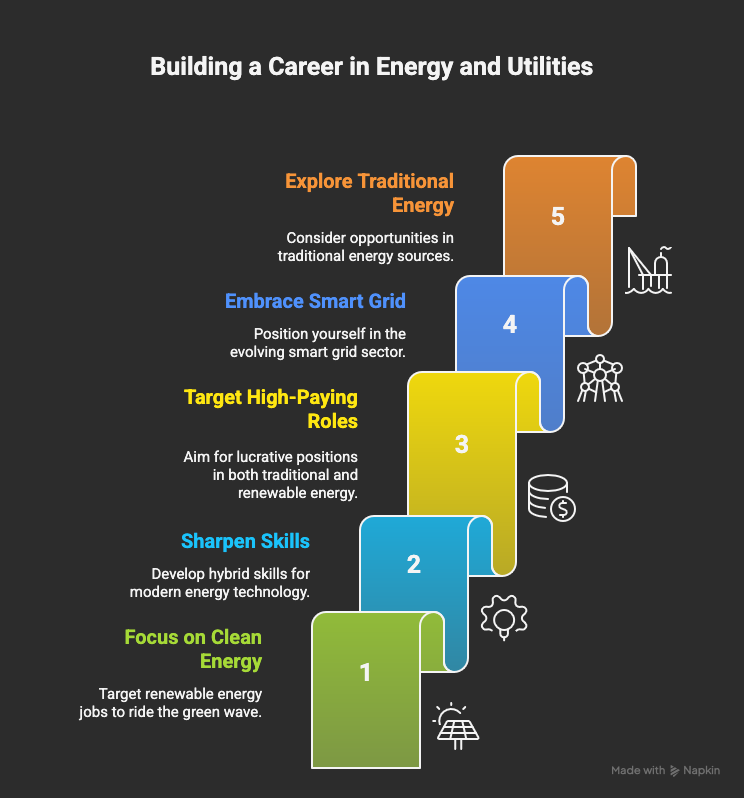How can you build a future-proof career in the Energy and Utilities sector?
Focus on clean energy, smart grid technology, and sustainability-driven roles. Build hybrid technical and regulatory skills, pursue certifications in renewable energy or data analytics, and stay adaptable as the industry evolves toward digitization, efficiency, and green innovation.
The Energy and Utilities sector is undergoing a massive transformation. It's not just about power plants and transmission lines anymore.
Today, it’s about sustainability, technology, and innovation.
If you're looking for a dynamic and future-proof career, this is the place to be.
But how do you break in and build a successful career?
This guide will give you 5 actionable strategies to build a thriving career in the Energy and Utilities sector.
1. Ride the Green Wave: Focus on Clean Energy
Clean energy is the undisputed engine of job growth in the energy sector. The U.S. clean energy workforce has grown to 3.56 million, with clean energy accounting for 7% of all new jobs in 2024.
To put it in perspective, for every one job in fossil fuels (excluding oil), there are five in the renewable energy sector, as noted by Inspire Clean Energy.
You can build a future-proof career by strategically targeting the most critical and rapidly expanding roles within this space.
Target in-demand renewable energy jobs. Some of the most sought-after roles include:
- Solar Photovoltaic (PV) Installers: These professionals are on the front lines of the solar revolution.
- Wind Turbine Technicians: With the growth of wind energy, these technicians are essential for keeping the turbines running.
- Energy Storage Engineers: As renewable energy sources are intermittent, energy storage solutions are critical.
Also Read: How to build a career in sustainability?
2. Sharpen Your Skills for the Future
In today's energy sector, technical knowledge is just the starting point.
The industry is becoming a high-tech field, and employers are desperately seeking professionals who can bridge the gap between traditional energy concepts and modern technology.
Vague soft skills are not enough; you need to cultivate a specific, hybrid skill set.
For instance, instead of just listing "data analysis," you should develop expertise in using data for predictive maintenance on wind turbines or optimizing grid load balancing.
Likewise, strong project management skills are non-negotiable for overseeing complex undertakings, from the construction of a new solar farm to a multi-year grid modernization project.
Furthermore, a deep understanding of regulatory compliance is a massive advantage, as navigating the intricate web of energy policies can make or break a project.

3. Target the High-Paying Roles
The energy and utilities sector offers some of the most lucrative careers.
While some of the highest-paying jobs are in the traditional oil and gas sector, the renewable energy sector also offers high-paying opportunities.
Aim for the top-paying jobs. Some of the highest-paying roles in the energy sector include:
- Petroleum Engineer: With an average annual salary of $127,093 in the US, this remains one of the best-paying jobs in the energy sector, according to Nexford University. Their high salaries reflect the immense technical skill required to manage complex drilling operations and maximize production from oil and gas reservoirs.
- Geoscientist (Oil and Gas): With the potential to earn an average of $146827 in the US, geoscientists are among the highest-paid professionals in any industry. Their expertise is in high demand because they are the ones who identify and assess potential oil and gas deposits.
- Renewable Energy Engineer: As the clean energy sector booms, the demand for skilled engineers is skyrocketing, with salaries ranging from $90,000 to $129,500 per year, according to ZipRecruiter. Their competitive salaries are a direct result of the urgent need for their expertise in a rapidly growing market that is hungry for innovation.
4. Embrace the Smart Grid Revolution
The traditional power grid is getting a major upgrade. The smart grid, which uses digital technology to improve the reliability, efficiency, and security of the electric grid, is creating a new wave of jobs.
The implementation of the smart grid is expected to result in about 280,000 new positions, according to a report from the U.S. Bureau of Labor Statistics.
Position yourself for a career in the smart grid. Some of the key roles include:
- Smart Grid Engineers: These professionals design and implement smart grid systems.
- Data Scientists: The smart grid generates a massive amount of data, and data scientists are needed to make sense of it all.
- Cybersecurity Analysts: As the grid becomes more connected, protecting it from cyber threats is a top priority.
5. Don't Discount Traditional Energy Just Yet
While clean energy is the future, traditional energy sources like natural gas and nuclear still play a significant role in our energy mix.
The oil and gas supply sector added nearly 600,000 jobs in 2023, according to the International Energy Agency.
Explore opportunities in the traditional energy sector. While some roles like Power Plant Operators are projected to decline, the sector still employs a large number of people.
For instance, the 2024 median pay for power plant operators, distributors, and dispatchers was $103,600 per year, according to the U.S. Bureau of Labor Statistics.

Wrapping Up
Building a career in Energy and Utilities is about staying ahead in a sector that evolves with every breakthrough in technology and sustainability.
The opportunities are vast, but so is the competition. That’s where the right preparation makes all the difference.
If you’d like AI-powered support in making your next move - from refining your resume to practicing interviews, and optimizing your LinkedIn profile, Hiration can help you stand out with confidence.
With the right preparation, you can position yourself for a rewarding future in the Energy and Utilities sector.
Energy & Utilities Career — FAQ
Is the energy and utilities industry still a good career choice?
Yes. The sector is expanding rapidly with clean energy, digital transformation, and smart grid innovations creating millions of new roles across engineering, data science, and sustainability.
Which areas in energy offer the most job growth?
Clean energy leads the way — particularly solar, wind, and energy storage. The U.S. clean energy workforce surpassed 3.5 million jobs, outpacing fossil fuel employment by a 5:1 ratio.
What technical skills are most in demand?
Employers seek hybrid professionals skilled in data analytics, grid optimization, predictive maintenance, and regulatory compliance, alongside traditional engineering knowledge.
What are the highest-paying jobs in the sector?
Top-paying roles include Petroleum Engineer ($127K+), Geoscientist ($146K+), and Renewable Energy Engineer ($90K–$129K). These roles demand advanced technical expertise and project leadership skills.
What is the “smart grid,” and why does it matter?
The smart grid uses digital technology to modernize power distribution, improving reliability and efficiency. It’s expected to create over 280,000 new jobs in engineering, data analysis, and cybersecurity.
Should I consider traditional energy roles?
Yes. Traditional energy sources like gas and nuclear remain vital. The sector added 600,000 jobs in 2023, and roles like Power Plant Operator still pay above $100K annually.
What certifications can boost my career in energy?
Certifications in renewable energy systems, energy auditing, or project management (PMP) are highly valued. For engineers, specialized credentials like LEED or NABCEP can also enhance credibility.
How can I stay competitive in the evolving energy market?
Stay informed on sustainability trends, invest in digital literacy, and focus on cross-disciplinary learning—combining engineering, data science, and regulatory understanding to stay future-ready.



